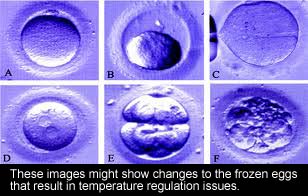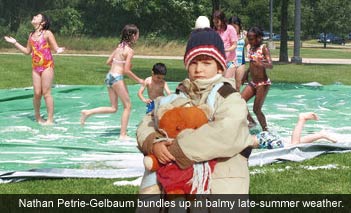Freezing Eggs To Extend Fertility May Lead To Unexpected Health Concerns For Offspring
Children born from previously frozen eggs have shown unusual body temperature regulation disorders.
By TRAVIS MOORE
Published October 5, 2013
Even as a girl, Elizabeth Richardson-Simons seemed maternal. The oldest of four, she was the most sought-after babysitter in her Bethesda, Maryland neighborhood. In 1998 Richardson-Simons reached the milestone of 35-years-old. Although she was as beautiful as she had ever been, after years of mounting worry about her biological clock Richards found an experimental way to free herself – and her fertility. Over the next two years, she submitted to eight rounds of experimental egg freezing – a process that lets a woman use her younger, and ostensibly healthier, eggs when she is ready to conceive.
 Richardon-Simon’s son, Miles, was among the first babies born in the United States from a frozen egg – or “oocyte.” Now eight years old, Miles looks like almost any other child. Indeed, Richardson-Simons is thrilled that she took part in the oocyte-freezing research. But Miles and many children like him born of frozen oocytes have shown a number of novel medical issues, the most prominent of which is a natural body temperature below 97-degrees Fahrenheit.
Richardon-Simon’s son, Miles, was among the first babies born in the United States from a frozen egg – or “oocyte.” Now eight years old, Miles looks like almost any other child. Indeed, Richardson-Simons is thrilled that she took part in the oocyte-freezing research. But Miles and many children like him born of frozen oocytes have shown a number of novel medical issues, the most prominent of which is a natural body temperature below 97-degrees Fahrenheit.
“Even as a little boy, Miles always felt cold,” said Richardson-Simons. Doctors at the Center for Reproductive Medicine at Brigham and Women’s Hospital in Boston wrote off Miles’ symptoms as a flu bug. As more children were born of frozen oocytes, however, a pattern emerged.
“We have seen at least 50-percent of children whose birth derives from frozen oocytes often feel ‘cold’ in their daily lives,” said Barbara Manheim-Lowe, an associate professor at Harvard Medical School. “Of these children, nearly 100-percent have body temperatures at least one degree below normal,” she added.
 Another mother of a child born of a frozen oocyte is 51-year-old Monica Petrie-Gelbaum. Her seven-year-old son, Nathan, began complaining a feeling “cold” almost as soon as he could talk. “Nathan always needed extra blankets, and now when he goes outside – even in 60-degree-weather – he insists on getting dressed up like an Eskimo.”
Another mother of a child born of a frozen oocyte is 51-year-old Monica Petrie-Gelbaum. Her seven-year-old son, Nathan, began complaining a feeling “cold” almost as soon as he could talk. “Nathan always needed extra blankets, and now when he goes outside – even in 60-degree-weather – he insists on getting dressed up like an Eskimo.”
Scientists are puzzled at the apparent link between freezing eggs and the inaccurate regulation of body temperature post-birth. Rebecca Wolf-Johnson at Santa Marino College School of Medicine believes it may relate to minute changes to the DNA molecules in the egg cell. “The freezing temperatures likely alter the DNA such that the egg is better adapted to its cold environment,” she said. Wolf-Johnson postulates that once the DNA from the egg is absorbed by a human embryo, the embryo may possibly “mimic the previous refrigerated environment to some degree.”
Parents of children with inaccurate temperature regulation have been struggling to find solutions to their new problem. It seems that solving their fertility issues only brought new ones on. Some busy parents simply unable to cope with the burdens of caring for a disabled child have been forced to place their newborns or young children up for adoption.
“What really stings is that I was convinced to spend over $35,000 for something that did not work.”
Others have fought back legally. Samantha Cole-Brooke, a 50-year-old mother in Brooklyn New York, filed a class-action lawsuit against New York State’s largest fertility clinic Never Too Late. The suit alleges that Never Too Late failed to disclose the common temperature regulation disorder occurring in children born of frozen eggs even though it was aware of the issue since approximately 2005.
“What really stings is that I was convinced to spend over $35,000 for something that did not work,” said Cole-Brooke. Cole-Brooke’s child, Jonathan, turned 16-years-old in September. He spends most of his hours outside of school in a dry sauna built in Cole-Brooks’ backyard. Never Too Late did not respond to email requests for comment.




